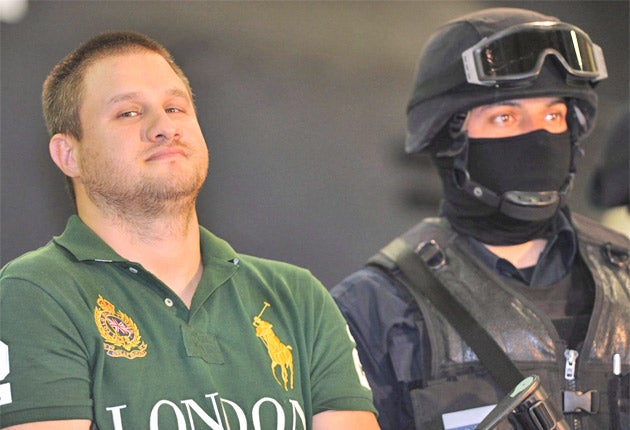Your support helps us to tell the story
From reproductive rights to climate change to Big Tech, The Independent is on the ground when the story is developing. Whether it's investigating the financials of Elon Musk's pro-Trump PAC or producing our latest documentary, 'The A Word', which shines a light on the American women fighting for reproductive rights, we know how important it is to parse out the facts from the messaging.
At such a critical moment in US history, we need reporters on the ground. Your donation allows us to keep sending journalists to speak to both sides of the story.
The Independent is trusted by Americans across the entire political spectrum. And unlike many other quality news outlets, we choose not to lock Americans out of our reporting and analysis with paywalls. We believe quality journalism should be available to everyone, paid for by those who can afford it.
Your support makes all the difference.Impeccably groomed and holding back a smirk, he looked more like an off-duty polo player than one of the world's most wanted drug barons. But this was Edgar Valdez Villarreal, the brutal gangland enforcer whose pale skin, blond hair and occasionally sunny disposition meant that he became known across Mexico by the incongruous nickname "La Barbie".
Police in Mexico City announced on Monday that they had captured Valdez, 37, following a year-long intelligence operation. He is blamed for a wave of violence which has swept through central regions of the country.
The exact circumstances of his arrest remain a mystery, but official photographs suggest that Valdez was taken without a struggle. "This capture constitutes a blow of great impact against organised crime," the government's security spokesman, Alejandro Poire, told a press conference. "Edgar Valdez Villarreal is a highly dangerous criminal."
For Mexico's President Felipe Calderon, the arrest should on the face of it represent an important coup. He duly trumpeted it on his Twitter feed, announcing that his forces had "trapped La Barbie, one of the most wanted criminals in Mexico and abroad".
The fall of Valdez – the third major drug baron to be captured or killed in recent months – is unlikely to provide more than a blip to the bloodshed that has left 28,000 people dead in the three years since Mr Calderon declared "war" on the cartels who use Mexico to smuggle cocaine from South America, where it is produced, to the United States, where it is consumed.
It will do nothing to stem demand for the drug and will have no impact on the huge profits, of roughly 3,000 per cent, available to people who are able to transport cocaine across the US border. Neither will it do much to stem the flow of automatic weapons into Mexico from Texas, which has the most relaxed gun control laws in the developed world.
If history is a guide, the arrest may lead to a medium-term increase in violence, as rival groups of his former associates battle it out for the territory he once controlled. Valdez owed much of his own rise to the killing of his former boss, Arturo Beltran Leyva, who was gunned down by marines in Cuernavaca in December.
Since then, Valdez and his associates had been fighting gang members loyal to Hector Beltran Leyva, Arturo's brother, for control of the cartel's former patch. Their increasingly bloody conflict brought violence to many of the previously peaceful central regions of the country.
Last week, for example, four decapitated bodies were hung from a bridge in Cuernavaca, along with a message threatening allies of "La Barbie" and signed by supporters Hector. Two more bodies were hung from bridges near Acapulco later in the week.
The US State Department's website says that Valdez, who was born and raised in the Texan city of Laredo – he owes his nickname to a high-school American football coach who noted his resemblance to Barbie's boyfriend Ken – is "the person most responsible for pushing the battle into central and southern Mexico".
The US may now ask Mr Calderon to extradite Valdez to Atlanta, where he faces an indictment for helping transport thousands of pounds of cocaine into the country.
* Six women and two men died in a fire at a bar frequented by local people in the Mexican resort of Cancun yesterday. Staff told police that unidentified men tossed petrol bombs at the bar in a low-income area far from the city's tourist zone. Businesses in Mexico are often hit for protection money by the drugs cartels.

Join our commenting forum
Join thought-provoking conversations, follow other Independent readers and see their replies
Comments